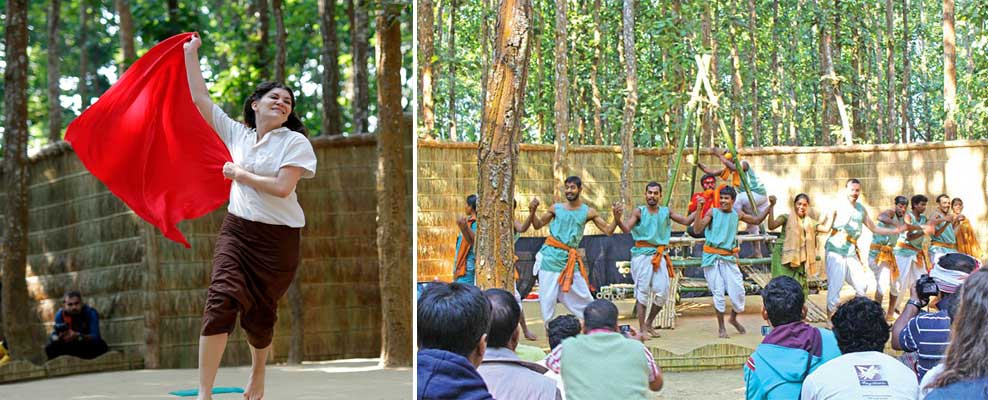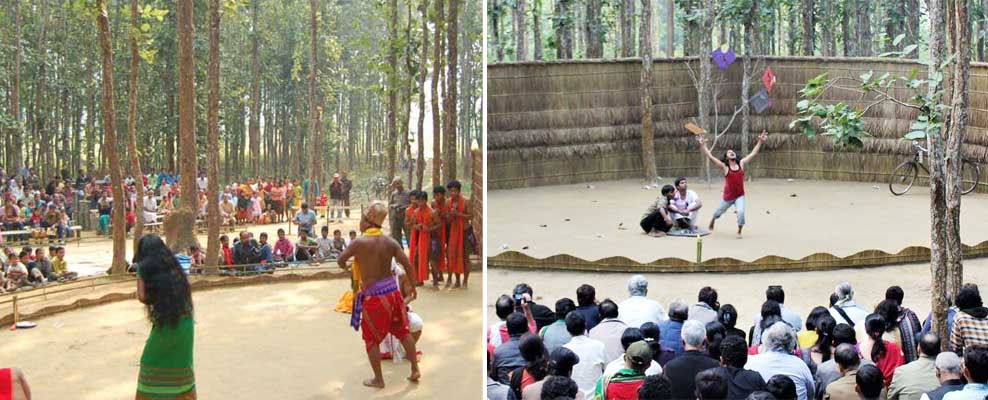In a small, secluded village, Rampur, in Goalpara district, Assam, Sukracharjya Rabha, an eminent theatre personality, came up with a totally bohemian concept of theatre in the year 2009. This was in the form of a theatre festival which rapidly garnered immense popularity amongst village people and theatre lovers from all over the country. In fact, the festival soon attracted the attention of International theatre groups as well.
In the month of December, when there is a nip in the air and the spectators are enthusiastic and at their appreciative best, this festival is celebrated in a purely natural environment. No microphone, no make-up, no prompting and no artificial lighting! You have to see it to believe it! And Rampur is just a drive away from Guwahati. Believe you me its well worth the effort if you are a theatre buff. Mr. Rabha’s concept relied upon only fresh air and the brightness of the sun’s rays for its special effects! The soothing rays on a winter morning seeping surreptitiously through the branches of the beautiful Sal trees created the most awesome effect! They were a crucial ally for creating a natural spotlight on the performers and lighting up the venue.

The village people often traversed long distances cycling frantically to reach Rampur on time. Such was the local fervor for this festival! Sadly, the man behind this concept, Sukracharjya Rabha, suddenly succumbed to a stroke in June, 2018, much to the dismay of the people of Assam. His organization, Baddungduppa, which he set up in 1998, is the only tribal theatre group in Assam comprising the Rabha tribe. This was in collaboration with the Theatre Embassy, Netherlands, an organization of international repute. I believe this was the crucial turning point for the theatre industry in Assam. To give you a brief background of the history, the armed struggle peaked in the 1990s and invariably absorbed many impressionable youngsters. Baddungduppa provided a viable career option for them. Mr. Rabha entirely transformed the region and his efforts were instrumental in channelizing the misguided youth into a worthwhile occupation. Art, with its ability to lift the spirits of the most reticent, breathed life into the insurgency prone area.
When I first happened to visit Rampur, I was startled as I saw how the stage and the seating arrangements have been built without cutting down a single Sal tree. They were cleverly formed around the natural space existing beneath the canopy of huge trees. The benches, both budget-friendly and eco-friendly, were fabricated out of betel nut trees and the famous bamboo of Assam. Mr. Rabha taught us to value nature and devised the perfect way to preserve and adorn the region with his open-air theatre. And today I can proudly see it in the global participation the “Under the Sal Tree” festival has seen from countries like Sri Lanka, Poland and Brazil last year.
The performers succeeded in holding the audience spellbound with their spontaneity, grace and their immense talent of course. The expert training given to them by Mr. Rabha led to their sterling performances. The idea behind this form of theatre was to give the actors the freedom to perform without the aid of artificial props. The challenge was to use their presence of mind, natural flow of language and strength of voice.

The theme of Mr. Rabha’s four-day festival is – “Celebrating theatre through the medium of rituals.” This focused on the fact that rituals are an innate part of our rich cultural heritage. It is imperative that this heritage, steeped in ritualistic traditions be preserved and consistently reiterated in the form of theatrical expressiveness. His most notable plays include Madaiah Muchi, a Rabha adaptation of the original Kannada play scripted by Professor H.S.Shivprakash and presented by Baddungduppa, the Rupalim, another adaptation of the Assamese playwright, Jyoti Prasad Agarwala’s work and original Rabha plays such as Dangai and Dumukchi. Despite the language barrier, actors such as Adil Hussain watched his plays and his words − “Through art, he has touched upon finer human sensibilities of love and respect” speak volumes about the impact on the audience. He proved that theatre can transcend language barriers and touch the hearts of people. The movie, “Ishu”, which recently won a National award, was filmed here and Mr. Rabha helped the director with the dialogues. Several members of the Baddungduppa Kala Kendra acted in the film.
Mr. Rabha’s vision and dream has to live on in the form of this unique theatre festival. The next step is to make it completely into an international festival. Here, we need people like Adil Hussain, who has been looking around for groups abroad to fund it. The Baddungduppa theatre must not be allowed to dwindle into only a faint echo of its former glory. My humble appeal to theatre lovers everywhere to help us in this endeavor to keep a unique concept alive and thriving at the same level it has always enjoyed since its inception. You can even write to Adil Hussain by visiting the official site myspace.com/adilworld. [1]
On this hopeful note, I leave you to ponder on the issue and pray for a successful outcome of the impending struggle I can foresee for our “Under the Sal Tree” festival.
Photo Credits – Banner Left: Sakal Times; Banner Center: The Wire; Banner Right: The Indian Express
